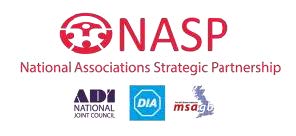

As part of the National Association’s regular cycle of meetings with DVSA, representatives from the three main ADI associations met with key personnel from the agency to discuss core areas of concern or inquiry from members, as well as hear updates on DVSA’s BAU delivery, as well as more strategic developments.
DVSA: Lianne Parkinson, Amanda Lane, Colin Stewart, Nick Taylor, Darren Russel, David Mann, Richard Beresford, John Selbey, Christian Oreschnick, Abigail Holland, Kim Hughes
NASP: Carly Brookfield, (DIA), Peter Harvey (MSA), Stewart Lochrie (ADINJC), Sara Skinner (DIA), Olivia Baldock-Ward (DIA)
Meeting summary
· Updated terms of reference discussion: All agreed to keep the quarterly meeting schedule with reactive meetings organised as and when needed. NASP asked for the 2-hour meeting limit to be removed to allow for flexibility.
· Collaboration with Communication teams: DVSA emphasised the importance of closer collaboration with NASPs communication teams to ensure alignment and sight of newsletter articles and industry-related announcements. DVSA suggested setting up regular meetings with their media team to discuss ongoing projects and share information early.
· Early information and industry announcements: NASP emphasised the importance of having early sight of information to avoid being blindsided by DVSA announcements. They highlighted past instances where lack of early information caused issues. Better coordination on industry-related announcements is needed, ensuring that ADI associations are informed in advance to provide accurate information to their members.
· Driving test measures announcement: NASP expressed surprise at the announcement of new driving test waiting times measures quoting Confused.com instead of ADI associations. DVSA agreed better collaboration with the Department for Transport (DfT) is needed to ensure that trusted stakeholders are used for announcements and that ADI associations have opportunities to review communications in advance.
· Monthly bulletin proposal: NASP proposed the idea of a monthly bulletin with metrics on testing and other relevant information to be shared with associations for inclusion in their newsletters. They emphasised the importance of providing useful and publishable data.
· Demand for ADI tests: NASP and DVSA discussed the high demand for ADI tests, with a total hold list of 4,829 and significant numbers of part 2 and part 3 tests being delivered.
o Recruitment challenges: DVSA highlighted the challenges in recruitment, noting that the team is working hard but is under headcount. They mentioned the approval to increase the team by 11 headcounts to help meet demand.
o Performance data: DVSA shared performance data, including the number of tests delivered and the increase in test delivery compared to the previous year. They emphasized the team’s efforts to turn out accelerated numbers.
o DBS checks: DVSA provided an update on the consistently high demand for DBS checks, with nearly 30,000 checks conducted in 24/25. The demand has continued to increase over the last few years.
o Tender process: DVSA is in the ongoing tender process for a new contract for the provision of DBS checks, which is time-consuming but necessary to ensure continued service.
· Quality of ADI candidates: NASP and DVSA discussed the challenges in managing the high volume of ADI applications and the need for better quality assurance processes. They discussed the benefits of introducing aptitude tests to weed out unsuitable candidates.
o Legislation constraints: DVSA explained the constraints of current legislation, which requires allowing candidates to start the process if they meet minimum criteria.
o Managing expectations: DVSA emphasised the importance of managing candidates’ expectations and ensuring fairness in the application process. They discussed the challenges of dealing with high volumes and the impact on quality output.
o Pre-screening of applicants: DIA have scoped and developed a framework of screening applicants that DVSA may be able to use. DIA will share this with DVSA to review and consider
· Support for ADI candidates: NASP emphasised the importance of providing support and training for new ADI candidates. They highlighted the need for ongoing CPD and collaboration with the industry to ensure quality training.
o Quality of training: NASP discussed the challenges faced by people wanting to become an ADI, noting that some may not currently be receiving adequate support. They stressed the need for all who train ADIs to take responsibility for training quality.
· Review of ADI Code of Conduct: NASP suggested reviewing the ADI Code of Conduct to ensure it is fit for purpose and addresses current industry challenges. They proposed bringing suggestions to the next meeting for discussion.
o Safeguarding: NASP mentioned the importance of including safeguarding and suitable relationships in the Code of Conduct, reflecting current concerns and industry standards.
· Coaching guidance: DVSA shared an initial draft coaching guidance to support the campaign and asked NASP for feedback on the concept and how it could be received by the industry. NASP raised concerns about linking the guidance to the test and campaign as this might deter some ADIs from using coaching. DVSA explained they wanted to collect insight first to better understand ADIs use and understanding of coaching before progressing this work any further. DVSA to share the draft coaching questions and consider how to broaden the campaign so messages start earlier in the journey.
· Foreign licence holders: NASP raised concerns about the behaviour of foreign licence holders and companies offering services to bypass driving tests. NASP to share the evidence they have with DVSA.
· PVG reference number: DVSA addressed the issue of ADI renewals in Scotland requiring a PVG reference number, which takes several weeks to obtain. DVSA suggested ADIs in this situation should email PADI@DVSA.gov.uk or call the customer service centre on 0300 200 1122. ADIs will need to include their ADI number in the email or have it to hand when they call to help with the renewal.
· Communication with ADIs: NASP and DVSA discussed the importance of better communication with ADIs, especially regarding investigations and prosecutions. NASP emphasised the need to show appreciation for ADIs’ efforts and provide timely updates.
Actions: